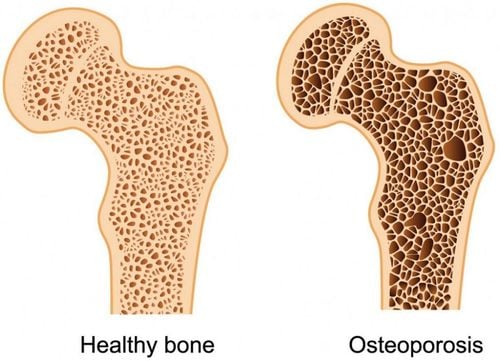This is an automatically translated article.
Calcium lactate is an oral calcium salt used to prevent or treat low blood calcium levels in people who do not get enough calcium from their diet, patients with osteoporosis, weak bones, decreased parathyroid gland activity. or people who need to supplement calcium such as pregnant, lactating, or post-menopausal women.
1. What is the effect of Calcium lactate?
Calcium lactate drug with the main ingredient is calcium lactate pentahydrate, which helps to provide calcium which is an essential cation for the stability of the function of the nervous system, muscles, bones and permeability of cell membranes and capillaries. The drug is usually indicated for the treatment of:
Osteoporosis Osteoporosis Chronic hypoparathyroidism Rickets Latent tetani syndrome Hypocalcemia secondary to anticonvulsant medication Support for myasthenia gravis, Eaton syndrome- Lambert Complementary therapy for women in pregnancy, postmenopausal or lactation Calci lactate is contraindicated in the following cases:
Patients with hypersensitivity to any component of the drug Patients with other conditions Medical conditions leading to hypercalcemia and urinary calcium: Severe kidney disease, hypercalcemia, bone destructive malignancies, hypercalciuria, immobility-induced osteoporosis Patient is taking digitalis because of the risk of digitalis toxicity Vibration the seventh
2. Dosage of the drug Calcium lactate
To use calcium supplements such as Calcium lactate, the dosage should be based on daily needs and clinical condition and/or blood calcium levels. The specific dose is as follows:
Adult prevention of hypocalcaemia: 1g elemental calcium/day Treatment of calcium deficiency: 1-2g or more elemental calcium/day Prevention of osteoporosis for women: recommended dose is 1 -1.5g elemental calcium/day Reduce the risk of osteoporosis due to long-term use of glucocorticoids: 1.5g elemental calcium/day Children: the usual daily supplement dose is 45-65mg/kg based on elemental calcium . In infants with hypocalcemia: 50-150 mg elemental calcium/day and should not exceed 1g elemental calcium/day Daily dose should be divided into 3-4 doses, taken after meals 1-1.5 When using high doses or overdoses of calcium lactate can lead to hypercalcemia conditions causing nausea, vomiting, abdominal pain, dry mouth, thirst, polyuria. At this time, the following should be managed:
Oral or IV rehydration in the early stages Use furosemide or other diuretics to increase calcium excretion (avoid thiazide diuretics because they increase calcium reabsorption in the body). Renal) Hemodialysis Check serum levels of essential electrolytes during treatment
3. Side effects of the drug Calcium lactate
In some patients when using calcium lactate, side effects may occur such as:
Digestive disorders: flatulence, nausea, vomiting, constipation Large skin rash, urticaria, rash Confusion, delirium due to sudden hypercalcemia
4. Be careful when using calcium lactate:
Some general notes when using calcium lactate drugs include:
Excessive calcium supplementation should be avoided in cases of low calcium because it can cause hypercalcemia, especially in patients with chronic renal failure. Maintain serum calcium levels in the range of 9-10.4 mg/dl and serum calcium levels generally should not exceed 12 mg/dl Caution should be exercised when using calcium lactate in patients with sarcoidosis, heart disease, or kidney disease. and in patients taking cardiac glycosides. Calcium supplements can increase the risk of kidney stones, so they should be avoided in patients with kidney stones. Avoid taking high doses of vitamin D while taking calcium pills. Lactate Should not be used for long-term treatment Common drug interactions with Calcium lactate include:
Concomitant use of vitamin D and derivatives that increase calcium absorption Do not take calcium lactate within 3 hours before or after when taking tetracyclines, fluoride, bisphosphonates, quinolones because they can form insoluble complexes that cannot absorb Calcium, increasing the cardiotoxicity of digitalis glycosides Glucocorticoids reduce calcium absorption from the digestive tract Thiazide diuretics reduce calcium urine, there is a risk of increasing blood calcium concentration c Calcium lactate is an oral calcium salt used to prevent or treat low blood calcium levels in people who do not get enough calcium from their diet, patients with osteoporosis, bone weakness, hypoparathyroidism or People who need extra calcium such as pregnant, lactating, or post-menopausal women. To ensure effective treatment and avoid unwanted side effects, patients need to take the drug exactly as directed by a doctor or pharmacist.
Follow Vinmec International General Hospital website to get more health, nutrition and beauty information to protect the health of yourself and your loved ones in your family.
Please dial HOTLINE for more information or register for an appointment HERE. Download MyVinmec app to make appointments faster and to manage your bookings easily.













